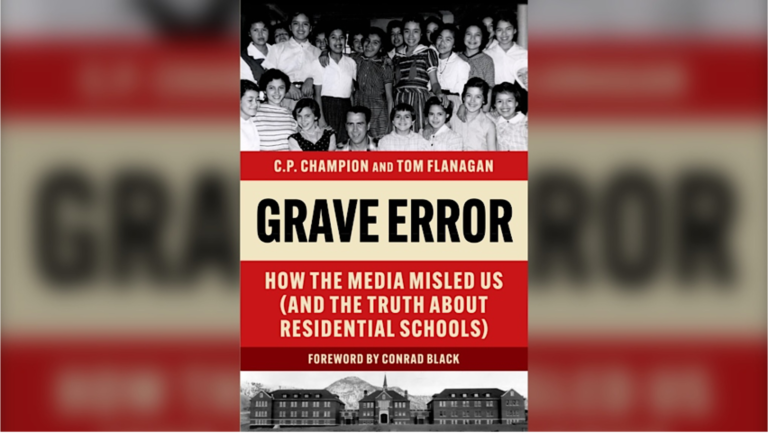In 1987, as the Reagan revitalization drew to an end, Allan Bloom published The Closing of the American Mind. It has taken nearly a quarter century for books to emerge that trace the promise of re-opening the Western soul.

What matters first is that conservatives take Eagleton’s eloquent savaging of morally flaccid capitalism and its attendant spiritual vacuity seriously.
What matters more is that we heed with deep attentiveness the hope implied in Eagleton’s call for a renewed understanding of the West’s foundation in the bond between faith and reason. What matters most is his conviction that this recovery must take place not just for the reassertion of faith but also for the rescue of reason.
“(I)t is only if reason can draw upon energies and resources deeper, more tenacious and less fragile than itself that it is capable of prevailing, a truth which liberal rationalism for the most part disastrously overlooks,” Eagleton writes in his 2009 book Reason, Faith and Revolution: Reflections on the God Debate.
Arguing effectively that there is a dimension of human life “more tenacious and less fragile” than reason is a bold move for anyone at the end of the first decade of the 21st century. For the argument to come from the pen of a leading Anglo-American scholar and cultural theorist (Eagleton holds professorships at the University of Ireland, Lancaster University and at Notre Dame; he has also been a distinguished speaker at Yale and Columbia) signals a significant cultural shift in the wind.
It is a shift that that has the potential to finally lead to removal of the intellectual “no exit” sign that has stood steadfastly since Bloom raised it over American (read: Western) thinking more than two decades ago. Contrary to the way it was initially understood, and vigorously embraced by misapprehending conservatives, The Closing of the American Mind was not a work of prophecy. It was, in fact a lamentation for the irredeemably lost.
In counterpoint to the ersatz “mood of moodiness” that he identified and deplored in American culture, Bloom was a genuine pessimist about the causes of the Closing. His conviction was that the American mind was not only closed to the Good, but was closed for good.
The quick notes version of the book summarized it as a plaint roused by the political correctness fad just then sweeping U.S. university campuses, and a tweaking of the academic twits promoting or acquiescing to it.
In fact, it was a substantive, and withering, critique of the way nihilistic 19th and 20th century philosophy had been openly welcomed ashore by unwitting American intellectuals after the Second World War.
Surviving Nazis had to at least flee at great risk to South American countries, change their names, check the accent and watch out for that twitchy right hand whenever someone in military boots clicked his heels. Against that, thinkers parroting Nietzsche and especially Heidegger – who was not only a Nazi but had attached his world historical intellectual pedigree to its evil – were given first-class passage and a comfortable chair in the salon when they arrived in North America.
The result, Bloom wrote, was a “particularly American way of digesting Continental despair. It is nihilism with a happy ending.”
Sadly, what was really ending in Bloom’s mind was America’s founding constitutional openness to common co-existence that required old habits to be subordinated to an understanding of natural rights and the acceptance of “a fundamental basis of unity and sameness.”
What was being rushed in to fill the void, he saw, was official Openness based on “Nietzschean values language” misconstrued to mean cultural relativism and the essential equivalence of all thought no matter how bad or how antithetical to the Good.
In the context of the era’s raging culture war, Bloom’s authentic American despair burst like twin hand grenades colliding in mid-air. The liberal left rained abuse on both the book and its author while the conservative right ran giddily around bayonetting its own.
Indeed, perhaps the only thing more remarkable than the conservative embrace of the decidedly anti-conservative classics professor from the University of Chicago was the extent to which The Closing of the American Mind corresponded, in its timing at least, to the end of any pretence of conservative coherence.
The staying power of electoral grasping and the weird alchemy of political nominalism led, over the ensuing years, to people being identified as conservatives who couldn’t stand to be in the same ideological room together. As the writer Tom Wolfe famously said, the only thing shared by fragmented paleocons, theocons, neocons, social conservatives, fiscal conservatives, libertarians and so on was their common refusal to go along with the “running gag” of postmodern North American thought.
As a lifelong Marxist, of course, Terry Eagleton has no personal interest in unifying conservatives. As a Catholic, however, he is intensely invested in asserting the existence of Truth. And as a gifted cultural critic, he is devoted to digging deep into what that Truth might be, and how it can be lived not only spiritually but also politically and culturally.
For conservatives, his line of thought is the re-opening that Bloom convinced us was probably permanently closed. It is the opportunity to re-examine the soul of Western conservatism, albeit through a very different lens than we may be accustomed to using. Eagleton forces us to confront, first and foremost, the truth that economic liberalism and agnostic capitalism may be necessary means to unbridled affluence, but they are not even close to sufficient grounds to healthy societies or individual lives well lived.
However we might have been able to muddle along for decades denying that truth, he argues, our denial simply cannot be sustained in the face of the muscular metaphysics of resurgent Islam.
“Advanced capitalism is inherently agnostic. This makes it look particularly flaccid and out of shape when its paucity of belief runs up against an excess of the stuff,” he writes in Reason, Faith and Revolution. “Liberalism of the economic kind rides roughshod over peoples and communities, triggering in the process just the kind of violent backlash that liberalism of the social and cultural kind is least capable of handling.”
Nor is the backlash a creature only of Islamist terrorists. Rather, it is the response of fundamentalism in all its forms, e.g., that 15-minutes of fame Florida yahoo who threatened to burn copies of the Koran in the name of Christianity.
“The ideologues of the religious right, aware in their own way that the market is ousting metaphysics, then seek to put those values back in place, which is one of several senses in which postmodern relativism breeds a red-neck fundamentalism. Those who believe very little rub shoulders with those ready to believe almost anything. “
The upshot, he warns, is an undermining of the metaphysical values on which political authority depends and a reduction of politics to mere culture or, worse, multiculturalism, that throw back to the inchoate state in which the only obligation to civic life is the wearing of a traditional hat or the display of grandmother’s dance steps on particular days of the calendar.
Paradoxically, these are the conditions in which a “surfeit of belief” flourishes, but it is a shallow form of faith that constitutes not a seeking after Truth but comprises the twin evils of excessive rationalism and religious fanaticism.
“A surfeit of belief is what agnostic, late capitalism itself has helped to spawn …because when reason becomes too dominative, calculative and instrumental, it ends up as too shallow a soil for a reasonable kind of faith to flourish. As a result, faith lapses into a kind of irrationalism theologians call fideism, turning its back on reason altogether. From there, it is an easy enough step to fanaticism.”
The resulting crude caricature of faith is precisely what anti-theists such as evolutionary biologist Richard Dawkins and journalistic gadfly Christopher Hitchens have seized on in their jeremiads against religion, belief and God. Conflating the two into a single entity that he dubs Ditchkins, Eagleton dismantles their claims like a wise priest dealing with a smart-aleck teen drunk on a cursory reading of the catechism.
Yet he stresses that Ditchkins is merely a symptom of the deep malaise wrought by postmodernity’s false assertion of the “end of grand narratives” and globalism’s premature proclamation of the “end of history,” both of which required fervent belief in the impossibility of reasoned faith continuing to undergird human life.
“Western civilization in the throes of later modernity, or postmodernity if you prefer, has to skate by on believing as little as it decently can. In post-Nietzchean spirit, it appears to be busily undermining its own erstwhile metaphysical foundations with an unholy mélange of practical materialism, political pragmatism, moral and cultural relativism and philosophical skepticism. All of this, so to speak, is the price you pay for affluence.”
Affluence bred from the spinning apart of faith and reason militates against the creation of “loving fidelity and peaceable community” (both of which lie at the core of conservative thought) and leaves us with a politics whose sole end is the bedding down of culture with power. What we end up with, Eagleton argues, is the current mutually antagonistic clash of culture and civilization or, put simply, the universal and plural against the local and customary (“or, as some might translate these terms, the Germans and the French”).
“One of the most pressing problems of our age is that civilization can neither dispense with culture nor easily coexist with it. The more pragmatic and materialistic civilization becomes, the more culture is summoned to fulfill the emotional and psychological needs (civilization) cannot handle. The more, therefore, the two fall into mutual antagonism.”
Reasoned religious faith is the one human endeavor with the power to bridge this chasm. Art cannot do it because it can only “render us more sensitive to what needs to be repaired” without ever being able to offer full redemption. The Romantic humanism and Enlightenment rationalism of Marxism might once have held promise but, Eagleton ruefully admits, it has “suffered in our time such a staggering political rebuff” that its best impulses must be sought elsewhere.
Eagleton warns us against being seduced by the Ditchkins cartoon of religious faith as an automatic condition for sectarian violence.
“The fundamental moral values of the average Muslim dentist who migrates to Britain are much the same as those of an English-born plumber. Neither will typically maintain that lying and cheating are the soundest policy or that children are at their finest when regularly beaten to a pulp. As far as religious morality goes, it is hard to slide a cigarette paper between Allah and Jehovah. This is, indeed, what Ditchkins finds so repugnant about it.”
Against such revulsion, he notes, is the enormous amount of good that could come from seriously listening to the moral congruence in, say, devout Muslim critiques of Western materialism, hedonism and individualism.
“A common culture in a more radical sense of the term is not one in which everyone believes the same thing, but in which everyone has equal status in cooperatively determining a common way of life.”
Therein lies the Good that Bloom held almost a quarter century ago had been closed to us for good. In large measure, this was because he believed in the soul and in reason but, like contemporary anti-theists, had no need for the hypothesis of God, much less for the power of reasoned faith to restore us.
Eagleton’s elevation of the “tragic humanism” at the core of all reasoned faith, the “process of self-dispossession and radical remaking” that faith promises, at least opens the door once more. It is a message conservatives of all kinds would do well to take to heart and mind.






